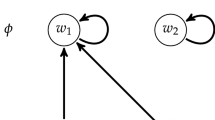Abstract
One very popular kind of semantics for subjunctive conditionals is aclosest-worlds account along the lines of theories given by David Lewisand Robert Stalnaker. If we could give the same sort of semantics forindicative conditionals, we would have a more unified account of themeaning of ``if ... then ...'' statements, one with manyadvantages for explaining the behaviour of conditional sentences. Such atreatment of indicative conditionals, however, has faced a battery ofobjections. This paper outlines a closest-worlds account of indicativeconditionals that does better than some of its cousins in explaining thebehaviour of such conditionals. The paper then discusses objectionsoffered by Dorothy Edgington and Frank Jackson to closest-worldsaccounts of indicative conditionals, and shows that these objections canbe met by the account outlined.
Similar content being viewed by others
REFERENCES
Adams, E.W. (1975): The Logic of Conditionals, Dordrecht: Reidel.
Davis, W.A. (1979): ‘Indicative and Subjunctive Conditionals’, Philosophical Review 88(4), 544–564.
Edgington, D. (1986):‘Do Conditionals Have Truth-Conditions?’, Critica 18(52), 3–30. Reprinted in Jackson, 1991, pp. 176–201. Page numbers given are for the Jackson collection.
Edgington, D. (1995):‘On Conditionals’, Mind 104(414), 235–329.
Ells, E. and Skyrms, B. (eds.) (1994): Probability and Conditionals, Cambridge: Cambridge University Press.
Gibbard, A. (1980):‘Two Recent Theories of Conditionals’, in W. Harper, R. Stalnaker and G. Pearce (eds.), Ifs (pp. 211–247), Dordrecht: D. Reidel.
Grice, H.P. (1975):‘Logic and Conversation’, in P. Cole and J. Morgan (eds.), Syntax and Semantics, New York: Academic Press.
Hajek, A. (1994):‘Triviality on the Cheap?’, in E. Ells and B. Skyrms (eds.), Probability and Conditionals (pp. 113–139),Cambridge: Cambridge University Press.
Hajek, A. and Hall, N. (1994):‘The Hypothesis of the Conditional Construal of Conditional Probability’, in E. Ells and B. Skyrms (eds.), Probability and Conditionals (pp. 75–112), Cambridge: Cambridge University Press.
Jackson, F. (1987): Conditionals, Oxford: Blackwell.
Jackson, F. (ed.) (1991): Conditionals, Oxford: Oxford University Press.
Kripke, S. (1980): Naming and Necessity, Oxford: Basil Blackwell.
Lewis, D.K. (1973): Counterfactuals, Oxford: Blackwell.
Lewis, D.K. (1976):‘Probabilities of Conditionals and Conditional Probabilities’, Philosophical Review 85, 297–315. Reprinted in Lewis 1986a.
Lewis, D.K. (1986a): Philosophical Papers, vol. 2, Oxford: Oxford University Press.
Lewis, D.K. (1986b):‘Postscript to Probabilities of Conditionals and Conditional Probabilities’, in D.K. Lewis (ed.), Philosophical Papers, vol. 2 (pp. 152–156), Oxford: Oxford University Press.
Lewis, D.K. (1996):‘Elusive Knowledge’, Australasian Journal of Philosophy 74(4), 549–567.
Lycan, W.G. (2001): Real Conditionals, Oxford: Oxford University Press.
McGee, Vann. (1985):‘A Counterexample to Modus Ponens’, Journal of Philosophy 82, 462–471.
Nolan, D. (1997):‘ImpossibleWorlds: AModestApproach’,Notre Dame Journal for Formal Logic 38(4), 535–572.
Stalnaker, R. (1968):‘A Theory of Conditionals’, in N. Rescher (ed.), Studies in Logical Theory, American Philosophical Quarterly Monograph Series, no.2 (pp. 98–112), Oxford: Basil Blackwell.
Stalnaker, R. (1975):‘Indicative Conditionals’, Philosophia 5, 269–286. Reprinted in Jackson, 1991, pp. 136–154. Page numbers given are for the Jackson collection.
Stalnaker R. and Thomason, R. (1968):‘A Semantic Analysis of Conditional Logic’, Theoria 36, 23–42.
Van Frassen, B. (1976):‘Probabilities of Conditionals’, in W.L. Harper and C.A. Hooker (eds.), Foundations of Probability Theory, Statistical Inference, and Statistical Theories of Science, Vol 1 (pp. 261–308), Dordrecht: D. Reidel.
Weatherson, Brian (2001):‘Indicatives and Subjunctives’, Philosophical Quarterly 51, 200–216.
Author information
Authors and Affiliations
Rights and permissions
About this article
Cite this article
Nolan, D. Defending a Possible-Worlds Account of Indicative Conditionals. Philosophical Studies 116, 215–269 (2003). https://doi.org/10.1023/B:PHIL.0000007243.60727.d4
Issue Date:
DOI: https://doi.org/10.1023/B:PHIL.0000007243.60727.d4



